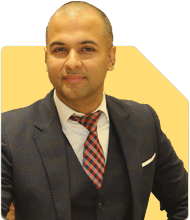Returning to India after 2-3 years: How to manage finances with 50,000/month income goal?
Ramalingam Kalirajan |8204 Answers |Ask -Follow
Mutual Funds, Financial Planning Expert - Answered on Nov 04, 2024
He has an MBA in finance from the University of Madras and is a certified financial planner.
He is the director and chief financial planner at Holistic Investment, a Chennai-based firm that offers financial planning and wealth management advice.... more

Dear Sir, I am 39 years old Non resident of India, I am planning shift back to India after 2-3 years time, can you please advise how manage the finances as of now I have all the savings outside India and earning interest of 3-4% per year, I am expecting minimum 50,000 return from investment per month to manage my expenses. pl advise.
1. Repatriation and Structuring of Overseas Savings
Since your current investments are abroad, the first step is understanding the options for repatriating them to India.
Repatriation Planning: Begin by consulting your bank and financial institution regarding repatriation rules. It’s vital to ensure the funds are structured to avoid penalties and tax complications.
Setting Up NRE and NRO Accounts: Open a Non-Resident External (NRE) account to allow repatriation of overseas funds without restrictions. A Non-Resident Ordinary (NRO) account can be used for income generated in India, such as interest or rent. Using both will help keep your finances clear and tax-compliant.
2. Evaluating Investment Options in India
To meet your goal of earning Rs 50,000 per month, a diversified portfolio in India is essential. Here’s a breakdown of suitable investment avenues.
Mutual Funds for Regular Income: Consider allocating a portion of your funds to actively managed mutual funds rather than index funds. Actively managed funds, driven by experienced fund managers, seek to outperform the market. This approach could yield returns that outpace index funds while diversifying across equity, debt, and hybrid options.
Debt Mutual Funds for Stability: Debt funds offer stable returns, fitting well for moderate risk tolerance. These funds invest in government and corporate bonds, providing regular income while balancing portfolio volatility. Remember, debt mutual fund gains are taxed according to your income tax slab.
Systematic Withdrawal Plan (SWP): With mutual funds, an SWP can ensure consistent monthly income. Once you have enough corpus, set up an SWP to withdraw Rs 50,000 monthly. This approach lets you keep the capital growing while drawing a steady income.
3. Explore Fixed Income Avenues with Safety in Mind
Maintaining a fixed income is crucial for your monthly expenses. Here are stable options that align with your goal.
Senior Citizens’ Savings Scheme (SCSS): Though only accessible after age 60, this scheme offers stable returns. Keep it in mind for future planning, as it’s safe and government-backed.
Post Office Monthly Income Scheme (POMIS): Consider POMIS once you’re back in India. It’s a low-risk investment offering monthly returns, though the maximum limit per individual is Rs 4.5 lakh.
Corporate Fixed Deposits: High-quality corporate FDs may yield higher rates than bank deposits, but with slightly higher risk. Choose AAA-rated FDs for safety. However, remember that interest from FDs is fully taxable.
4. Balancing Tax Efficiency with Growth Potential
Since tax policies differ for NRIs and residents, tax planning is essential to optimize your returns.
Use NRE and NRO Accounts: Interest on NRE accounts is tax-free in India, making them ideal for repatriated funds. NRO account interest is taxable, so keep only necessary funds there.
Plan for Mutual Fund Taxation: For equity mutual funds, long-term gains above Rs 1.25 lakh are taxed at 12.5%, while short-term gains incur 20% tax. For debt funds, both short and long-term gains follow your income tax slab. Keep this in mind while planning withdrawals.
Tax-Saving Options for Residents: Upon your return, you can invest in instruments like the Public Provident Fund (PPF) and National Pension System (NPS) for tax-saving benefits and long-term growth. PPF provides tax-free interest, while NPS offers a pension component, providing dual benefits post-retirement.
5. Building an Emergency Fund in India
An emergency fund ensures financial stability during the transition and beyond.
Liquid Funds: Liquid mutual funds offer easy access to cash with higher returns than traditional savings accounts. They are suitable for parking emergency funds in a low-risk format.
Bank Fixed Deposits: Indian banks offer FDs with decent returns and safety. Keep a part of your emergency fund here to access readily if needed.
6. Health and Life Insurance: A Vital Element
Insurance planning is crucial when moving back to India, as health and life coverages abroad may not remain valid.
Health Insurance: As an NRI, take up comprehensive health insurance in India, as it covers potential medical costs. It’s crucial to secure a higher cover, given rising healthcare expenses.
Life Insurance: If you already hold LIC or other policies abroad, evaluate them carefully. However, avoid ULIPs, as they often underperform due to high charges. Switch to term plans instead, which provide robust coverage with lower premiums.
7. Investing in Gold for Long-Term Security
Gold has historically acted as a hedge against inflation and currency fluctuations.
Gold ETFs or Sovereign Gold Bonds: Consider Gold ETFs or SGBs instead of physical gold for convenience and additional returns. SGBs offer interest along with potential price appreciation, providing dual benefits.
8. Estate Planning and Succession Strategy
With global assets, estate planning is essential to avoid complications later.
Drafting a Will: Prepare a will that covers both domestic and international assets, simplifying succession. This reduces legal hurdles and ensures smooth asset transfer.
Consider a Trust: If you have considerable wealth, creating a family trust ensures tax efficiency and asset protection, with added flexibility.
9. Final Insights for a Smooth Transition
Returning to India requires structured financial planning. Diversify your investments for growth and stability, with a mix of mutual funds, debt options, and insurance.
Maintain separate accounts for tax efficiency, and build an emergency fund for immediate needs. Plan your estate early for seamless asset transition.
For a steady monthly income, establish an SWP in your mutual funds post-return.
Best Regards,
K. Ramalingam, MBA, CFP
Chief Financial Planner
www.holisticinvestment.in
https://www.youtube.com/@HolisticInvestment
You may like to see similar questions and answers below
Ramalingam Kalirajan |8204 Answers |Ask -Follow
Mutual Funds, Financial Planning Expert - Answered on Jun 25, 2024
Ramalingam Kalirajan |8204 Answers |Ask -Follow
Mutual Funds, Financial Planning Expert - Answered on Sep 22, 2024
Ramalingam Kalirajan |8204 Answers |Ask -Follow
Mutual Funds, Financial Planning Expert - Answered on Feb 01, 2025
Samraat Jadhav |2250 Answers |Ask -Follow
Stock Market Expert - Answered on Apr 08, 2025
T S Khurana |438 Answers |Ask -Follow
Tax Expert - Answered on Apr 08, 2025
T S Khurana |438 Answers |Ask -Follow
Tax Expert - Answered on Apr 08, 2025
Mihir Tanna |1043 Answers |Ask -Follow
Tax Expert - Answered on Apr 08, 2025
Harsh Bharwani |79 Answers |Ask -Follow
Entrepreneurship Expert - Answered on Apr 08, 2025
Milind Vadjikar |1157 Answers |Ask -Follow
Insurance, Stocks, MF, PF Expert - Answered on Apr 08, 2025
Milind Vadjikar |1157 Answers |Ask -Follow
Insurance, Stocks, MF, PF Expert - Answered on Apr 08, 2025
Milind Vadjikar |1157 Answers |Ask -Follow
Insurance, Stocks, MF, PF Expert - Answered on Apr 08, 2025
Milind Vadjikar |1157 Answers |Ask -Follow
Insurance, Stocks, MF, PF Expert - Answered on Apr 08, 2025
Ramalingam Kalirajan |8204 Answers |Ask -Follow
Mutual Funds, Financial Planning Expert - Answered on Apr 08, 2025

























.jpg)